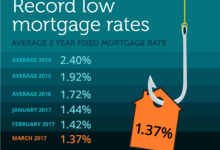The mortgage term and amortization schedule you select

The mortgage term and amortization schedule you select
The term is the duration of your mortgage deal. Mortgage lengths in Canada can range from six months to ten years. According to Statistics Canada, the most popular mortgage term is a five-year fixed-rate mortgage, which will account for 49% of Canadian mortgages in 2020.
The popularity of the 5-year fixed term may be due to the fact that many individuals, including financial institutions, like having a regular payment schedule without feeling trapped in a contract for an uncomfortably lengthy amount of time.
Period of amortization
Don’t mix the term of your mortgage with the amortization period, which is the amount of time it will take to pay off your mortgage completely.
In Canada, the most frequent amortization term is 25 years. In fact, if your down payment is less than 20% of the home’s worth, you cannot surpass a 25-year amortization period. If you can put down more than 20%, you can have an amortization term of up to 35 years.
Some borrowers choose the shortest amortization period possible.
Here are a few more mortgage contract words to be aware of:
- Temporary mortgage. Terms of no more than five years. A variable or fixed rate is available with a short-term mortgage. In general, the lower the interest rate, the shorter the term, but for many Canadians wishing to escape the vagaries of the economy, financial piece of mind may be worth the extra expenditure of locking in your mortgage for a longer length of time.
- Long-term financing. More than five-year terms Longer-term mortgages are typically fixed-rate only, with significant prepayment penalties if you terminate the contract during the first five years.
- Open the mortgage. An open mortgage is the most adaptable form of mortgage since it allows for debt prepayment without penalty, possibly saving you a lot of money on interest. However, you pay for this freedom with higher interest rates than you would with a closed mortgage, so you would actually lose money if you did not pay off the mortgage early.
- Mortgage was completed. A closed mortgage locks you into a mortgage contract for a fixed number of years in return for a cheaper interest rate. If you pay off your mortgage early, you will be assessed a substantial prepayment penalty.
- Mortgage protection. A high-ratio mortgage is one that requires mortgage default insurance if the down payment is less than 20% of the property’s worth. In the event that a borrower fails on their mortgage, the insurance protects the lender. Mortgage default insurance premiums typically vary from 0.60% to 4.50% of the total loan amount.
Prepayment penalty on mortgages
Prepayment penalties are fines that you may face if you pay off all or part of your mortgage before the term expires. Prepayment penalties are an essential factor to consider when considering what type of mortgage to have since they may cost you tens of thousands of dollars.
Prepayment penalties are computed differently depending on your lender and mortgage arrangement. The penalty charge for fixed-rate mortgages is generally the greater of:
Three months’ interest on the prepayment amount, or interest on the prepaid amount for the remaining period, computed using an interest rate differential (IRD).
The interest rate differential varies depending on the lender, but it is often computed as the difference between your existing mortgage rate and the rate currently posted by the banking institution.




